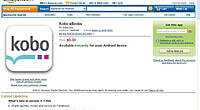
The long awaited Google game changer for eBooks is poised to launch in the USA this December and with an international launch in the first few months of 2011.
The Wall Street Journal recently had a chat with Scott Dougall, whom is the product management director at Google and he confirmed the December launch. He also mentioned that the long delay was “Because of the complexity of this project, we didn’t want to come out with something that wasn’t thorough.” He also anticipates Google garnering 20% of the entire ebook market by 2011, lofty goals to be sure.
Ok, great, its been a long time coming, with many delays with Google Editions, but with all of this in the news, what exactly is Google Editions? How does this new way of buying ebooks defer from the competition?
The way Google is going about their new ebook store concept is allowing the publishers to set the price of their ebook, and this a tremendously riveting. The Last six months there has been allot of complaints by some of the largest publishers about Amazon. More Specifically the fact that during the last few years Amazon has always set the prices of eBooks. Amazon sells e-books for a flat $9.99. Amazon accepts the loss on the ebook in order to gain market dominance. With this model in place the publishers lose out because their books are sold undervalued and major publishing companies such as Penguin as well as many smaller ones have severed ties with Amazon completely. Smaller publishing companies just cannot compete with the reduced price that Amazon sets.
Google is going in another direction abiding by the “agency model” , which allows the publishers to be the retailers, and the direct seller – in this case, Google – will take a cut of the sale price. That’s what allows the publishers, rather than Google, to set the sales price. Google will also host of all of the eBooks on their own servers, taking the burden of the sales process to be handled by Google directly.
A spokeswoman for Google said: “We’ve consistently maintained that we’re committed to helping our partners find more ways to make their books accessible and available for purchase online, and we’ve been sharing details with our partner publishers for some time now.”
As a Reader, you would able to buy eBooks you find through Google’s book search function and book retailers will be able to sell Google Editions on their own sites, getting most of the revenue from sales. Google Editions will be browser based, and have custom enhancements with its Chrome Web Browser and Google Slate device. One of the best features about this service is that you can purchase EBooks without locking you into a specific gadget, such as a E-Reader or Netbook or Slate PC. Google says its e-book strategy includes an electronic bookshelf for the books you access through Google via the cloud, “so you can come back and access [them] whenever you want in the future. They will exist in an offline mode as well, so you do not exclusively need to maintain an internet connection.
The aspect of putting direct control over the price of eBooks into the hands of the publishers, both large and small is ground breaking. If you look at one of the biggest stores Amazon, they lock you into their own E-Reader; the Kindle and Kindle DX. You will not be able to convert your books over to another format, or e-reader if you choose to upgrade or get a new one. Other stores do the same thing, mainly the older ones such as the Sony Book Store and the Barnes and Noble store.
So in essence, Google is building bridges and allowing authors and publishers to directly sell you ebooks, with Google acting as the Proxy. You will soon see Amazon, Barnes and Noble and all other book stores take advantage of Googles pet project and you can buy ebooks from the largest ebook behemoths, all the way to the independent author struggling for recognition.
Though in closing, the exact semantics of Google Editions is not known, such as their revenue model and how exactly it will empower authors to make a viable living distributing their books themselves, instead of being ham-stringed by a publishing company. We know that ebooks are exploding right now, with major companies and publications putting out their content on iBooks, Amazon, Barnes and Noble, Samsung, Kobo and a ton more. E-Readers are certainly more visible now to the average customer then ever before, and tablet computer sales are on the rise with an eager audience wanting more. Hopefully Google editions will take off and not go the route of Google Buzz or Google Wave.
via Wall Street Journal
Michael Kozlowski is the editor-in-chief at Good e-Reader and has written about audiobooks and e-readers for the past fifteen years. Newspapers and websites such as the CBC, CNET, Engadget, Huffington Post and the New York Times have picked up his articles. He Lives in Vancouver, British Columbia, Canada.
